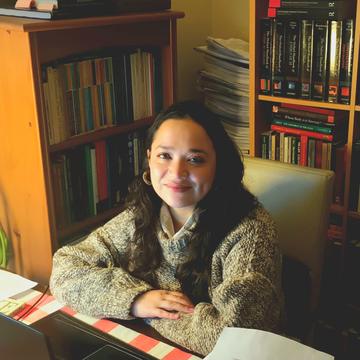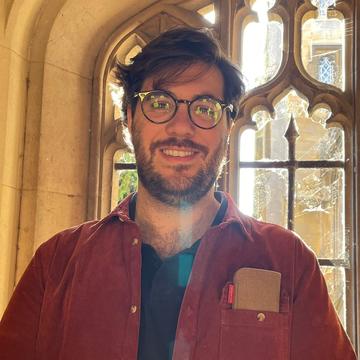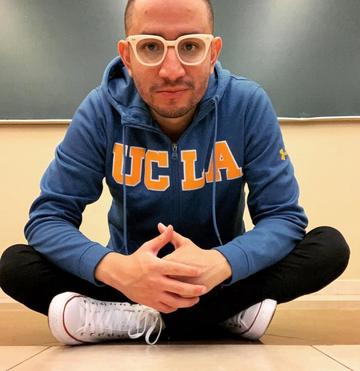Student Executive Committee
Student Executive Committee

Pía Chible (Co-Chair)
Current affiliation: University of Oxford, Law Faculty (doctoral student)
Degrees: Magister Juris from University of Oxford; LLB from Universidad de Chile.
Research interests: Moral, legal and political philosophy, constitutional theory and administrative law theory.
Research: My research examines the nature of the decisions that are reached by State administration. My aim is to show that the distictiveness of administrative law relates to the specific type of reasoning entailed in administrative decision-making. My account draws from literature of practical reason, philosophy of action, political philosophy and virtue ethics, as well as constitutional and adminsitrative law theory. My DPhil is being supervised by Dr Hasan Dindjer.

Thomas Bullemore (Co-Chair)
Current affiliation: University of Oxford, Law Faculty (doctoral student)
Degrees: MPhil from University of Oxford; LLB from Universidad de Chile.
Research interests: Metaethics and legal philosophy.
Research: I address a few puzzles facing contemporary normative realism—ranging from inconsistencies in hyperintensional accounts of proposition and property individuation, through underdetermination worries in the metasemantics of normative predicates, to concerns about methodological overfitting driven by intuition-sensitive theorizing. My work is supervised by David Enoch and Timothy Williamson.

Talita Ferrantelli (Co-Chair)
Current affiliation: LSE, Philosophy (doctoral student)
Degrees: MA in Philosophy and MSc Political Theory from University of Amsterdam; BA in Law Fundação Getúlio Vargas
Research interests: Social epistemology, and its interactions with legal and political philosophy.
Research: In my doctoral work, I explore questions that concern the legal and social epistemology of sexual offences. I'm working under the supervision of Lewis Ross, Federico Picinali and Liam Kofi Bright.

Anita Semerani (Communications Director & UCL Institutional Head)
Current affiliation: UCL, Philosophy (doctoral student)
Degrees: MA Scuola Normale Superiore, Pisa (Italy), MPhil UCL
Research interests: Philosophy of action, philosophy of mind, ethics, philosophy of law
Research: I work on a variety of issues at the intersection of philosophy of mind and ethics, in particular questions in philosophy of action, the theory of reasons and rationality, and moral psychology. I also have broader interests in political and legal philosophy. My PhD is being supervised by Ulrike Heuer, John Hyman, and Lucy O'Brien.

Shasha Sun (Social Media Manager)
Current affiliation: University of Oxford, Law Faculty (doctoral student)
Degrees: M.Phil from University of Oxford; Master of Law (Legal Theory) from China University of Political Science and Law; Bachelor of Law from Shandong University of Science and Technology.
Research interests: Legal and political philosophy.
Research: My research focuses on the justification of political authority, which asks when political authority is legitimate. I explore the conditions under which political authority has valid normative power to change our normative situations and the limitations on exercising that power. By investigating these ideas, I aim to better understand in virtue of which we have obligatory reasons to obey the state. My DPhil thesis is supervised by Dr. Dori Kimel and Professor David Enoch.

Raja Venkata Krishna Dandamudi (Institutional Heads' Manager)
Current affiliation: University of Cambridge, Faculty of Law (doctoral student)
Degrees: LL.M. (Legal Theory) from New York University; B.A., LL.B (Hons) from Jindal Global Law School.
Research interests: Jurisprudence, political philosophy, legal and constitutional history, history of political thought, history of the British Empire
Research: My PhD project is a historical and jurisprudential study of constitutionalism in colonial India (1858). It examines why an unjust political order such as the colonial state in India felt compelled to respect the rule of law and accommodate constitutionalism, and how subjects used this compulsion the colonial state’s part to resist repression, protect their rights and interests, and pursue their political aims. I am supervised by Dr Lars Vinx.
Institutional Heads

Javier Gallego (Oxford Institutional Head & Conference Coordinator)
Current affiliation: University of Oxford, Law Faculty (doctoral student)
Degrees: LL.M. (Legal Theory) from New York University; LLB from Universidad de Chile.
Research interests: Moral, legal and political philosophy, constitutional theory and legal ethics.
Research: My current work is about manipulation and the law. I’m working towards an account of inter-personal and institutional manipulation, and then offering some criteria to evaluate the moral status of legal manipulation. I’m also interested in the philosophy of normativity, general jurisprudence, constitutional rights (especially liberal rights), and animal rights.

Cheng-Chia Tung (King’s College London, Institutional Head)
Current affiliation: King’s College London, Department of Political Economy (doctoral student).
Degrees: MSc in International Political Theory from the University of Edinburgh; BA in Diplomacy and French from National Cheng-Chi University, Taiwan.
Research: My research focuses on military and economic confrontations, as well as the governance of interstate coalitions such as military alliances and trade blocs. I am currently focusing on the ethical dimensions of coalition membership by examining the normative questions of including or excluding non-democratic states. I am supervised by Dr Mollie Gerver, Dr Carmen Pavel, and Dr Jonathan Leader Maynard.

Benjamín Ruiz García (University of Surrey, Institutional Head)
Current affiliation: University of Surrey, School of Law (doctoral student)
Degrees: LLM Law and Philosophy from UCLA; LLB from ITAM.
Research interests: Jurisprudence, Eliminativism, Metaphysics, Law and Economics, Sports as Normative Systems.
Research: My research puts forward an account of legal institutions within the theoretical framework of the New Legal Anti-Positivism. My PhD thesis is supervised by Kenneth Ehrenberg.



